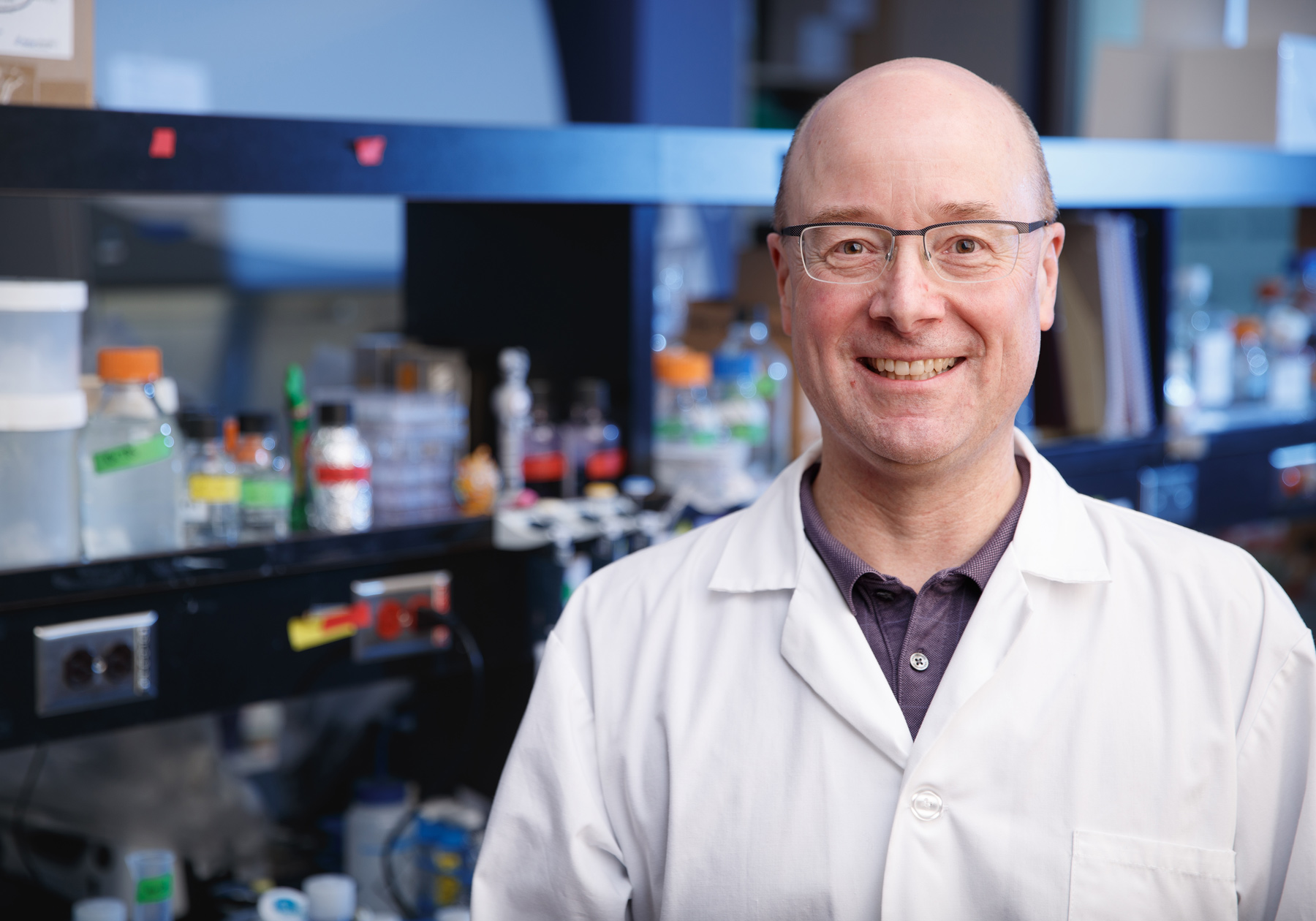Research Discipline(s): Fundamental, Translational, Cancer Biology, Cell Biology
Primary Title: Senior Scientist
Additional Titles & Affiliations: Professor, Biochemistry & Medical Genetics, University of Manitoba
RESEARCH TOPICS
Cancer Genetics, Colorectal Cancer, Ovarian Cancer, Chromosome Instability, Drug Target Discovery, Synthetic Lethality, Quantitative Imaging Microscopy, si/shRNA, CRISPR/Cas9
Our overarching goals are to determine how cancers develop so that we can exploit that information to develop innovative therapeutic strategies to better combat the disease.
Research Summary
Chromosome instability (CIN), or ongoing changes in chromosome numbers, is associated with virtually all cancer types and is believed to be an early event driving cancer development, progression, spread (metastasis) and drug resistance. Unfortunately, however, the mutated/aberrant genes giving rise to CIN remain largely unknown and unexplored. Accordingly, Dr. McManus believes that identifying the mutated/altered genes that cause CIN will not only provide the much-needed insight into how cancers develop but will reveal genetic vulnerabilities that can be therapeutically exploited to better combat the disease.
To enable this work, Dr. McManus’ collaborative cancer research team utilizes leading-edge biochemistry, bioinformatics, cell biology and genetic techniques along with complementary model systems including cell lines, patient-donated samples, tumor spheroids/organoids and in vivo models to identify and characterize the mutated/altered genes that cause CIN. These approaches and unique sample resources coupled with his state-of-the-art single cell, imaging microscopy techniques have enabled his team to gain unprecedented insight into the origins of CIN and determine its impact on cancer development, progression and drug resistance. Additionally, their work has revealed genetic vulnerabilities that his team is exploiting to identify new drug targets and develop innovative precision medicine strategies that better kill cancer cells.
An overarching goal of his research program is to provide undergraduate, graduate and post-graduate trainees with innovative, comprehensive and unique training opportunities to enhance and advance their career options within various economic sectors including research, industry, biotech, health delivery, education and policy development. Dr. McManus and his team are strong supporters of equity, diversity and inclusion in research and believe it is an essential driver of creativity, innovation and productivity.
Goals
Dr. Kirk McManus’ cancer research program has two fundamental goals:
- To identify the molecular origins (i.e., mutated/altered genes, proteins and cellular pathways) driving cancer development, progression and drug resistance; and,
- To therapeutically exploit the molecular origins of cancer to identify new drug targets and develop innovative therapeutic strategies that better combat the disease.
Research Biography
Dr. Kirk McManus is a Professor in the Department of Biochemistry and Medical Genetics at the University of Manitoba and a Senior Scientist within the Paul Albrechtsen Institute CancerCare Manitoba. He received a BSc (1995) and an MSc (1999) from the University of Manitoba and moved to Edmonton, Alberta to conduct his PhD studies (1999) in Experimental Oncology. There he studied the regulation and dynamics of post-translational histone modifications and their influence on chromosome segregation. His post-doctoral studies were performed at the Michael Smith Laboratories in Vancouver, BC, where he utilized cross-species approaches to identify genes that regulate chromosome stability and characterize their impact on cancer development. In June 2009, Dr. McManus was recruited to CancerCare Manitoba and the University of Manitoba, and his research interests focus on identifying and characterizing genes that regulate chromosome stability in cancer and exploiting these characteristics to identify novel therapeutic targets. He currently couples genetics, biochemistry and cellular biology along with innovative digital imaging microscopy to identify both genes and targets of interest.
Achievements
- Merit Award for Research & Scholarly Work, University of Manitoba (2022)
- Best Drug Discovery & Development Article of the Year, Scientists’ Choice Award (2016)
- Teaching Award, Graduate Student Association, University of Manitoba (2016)
- Merit Award for Research, Teaching & Service, University of Manitoba (2016)
- Ken Hughes Young Investigator Award for Medical Research, Rady Faculty of Health Sciences (2014)
- Rh Award for Outstanding Contributions to Scholarship and Research in Health Sciences, Winnipeg Rh Foundation/University of Manitoba (2014)
- CIHR/Manitoba Health Research Council, New Investigator Award (2010-12)
-
Featured Publications
- Jeusset LM and McManus KJ. Characterizing and exploiting the many roles of aberrant H2B monoubiquitination in cancer pathogenesis. Seminars in Cancer Biology. 2022;86:782-98. DOI: 10.1016/j.semcancer.2021.12.007 (IF; 15.707)
- Palmer MCL, Neudorf NM, Farrell AC, Razi T, Lichtensztejn Z and McManus KJ. The F-box protein, FBXO7 is required to maintain chromosome stability in humans. Human Molecular Genetics. 2022;31:1471-86. DOI: 10.1093/hmg/ddab330 (IF; 6.150)
- Thompson LL, Rutherford KA, Lepage CC and McManus KJ. Aberrant SKP1 expression: Diverse mechanisms impacting genome and chromosome stability. Frontiers in Cell and Developmental Biology. 2022;10:859582. DOI: 10.3389/fcell.2022.859582 (IF; 6.684)
- *Campos Gudiño R, *Farrell AC, *Neudorf NM and McManus KJ. A comprehensive assessment of genetic and epigenetic alterations identifies frequent variations impacting six prototypic SCF complex members. International Journal of Molecular Sciences. 2021;23:84. DOI: 10.3390/ijms23010084 (IF; 5.542) *denotes co-first authors
- Jeusset LM, Guppy BJ, Lichtensztejn Z, McDonald D and McManus KJ. Reduced USP22 expression impairs mitotic removal of H2B monoubiquitination, alters chromatin compaction and induces chromosome instability that may promote oncogenesis. Cancers (Basel). 2021;13:1043. DOI: 10.3390/cancers13051043 (IF; 6.102).
- Lepage CC, Palmer MCL, Farrell AC, Neudorf NM, Lichtensztejn Z, Nachtigal MW and McManus KJ. Reduced SKP1 and CUL1 expression underlie increases in Cyclin E1 and chromosome instability in cellular precursors of high-grade serous ovarian cancer. British Journal of Cancer. 2021;124:1699-710. DOI: 10.1038/s41416-021-01317-w (IF; 7.640)
- Morden CR, Farrell AC, Sliwowski M, Lichtensztejn Z, Altman AD, Nachtigal MW and McManus KJ. Chromosome instability is prevalent and dynamic in high-grade serous ovarian cancer. Gynecologic Oncology. 2021;161:769-78. DOI: 10.1016/j.ygyno.2021.02.038 (IF; 5.482).
- Bungsy M, Palmer MCL, Jeusset LM, Neudorf NM, Lichtensztejn Z, Nachtigal MW and McManus KJ. Reduced RBX1 expression induces chromosome instability and promotes cellular transformation in high-grade serous ovarian cancer precursor cells. Cancer Letters. 2021;500:194-207. DOI: 10.1016/j.canlet.2020.11.051 (IF; 8.679)
Publications List
McManus Lab
Our team is focused on identifying and characterizing the abnormal genes, proteins and pathways leading to genome (chromosome) instability in cancer and leveraging this information to develop innovative precision medicine strategies to better combat the disease. We are internationally recognized for our innovative work in cancer genetics, quantitative imaging microscopy, single cell analyses, chromosome instability and synthetic lethality. We have advanced and driven fundamental and applied health research by developing new research areas that integrate key elements of genetics, cell biology, biochemistry and computational biology.
Our Team

Kirk J. McManus, PhD
Principal Investigator

Kailee Rutherford
PhD Student

Tooba Razi
BSc Medicine Student

Zelda Lichtensztejn
Laboratory Manager

Mirka Sliwowski
Laboratory Technician

Demi Andromidas
BSc Medicine Student

Nicole Capri
MSc Student

Nicole Gerber
MSc Student

